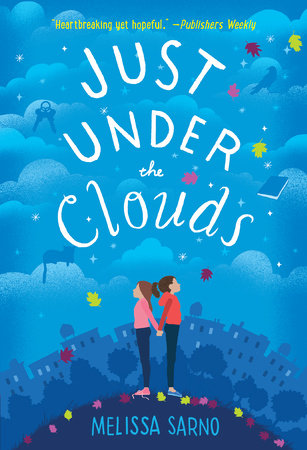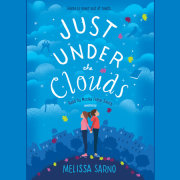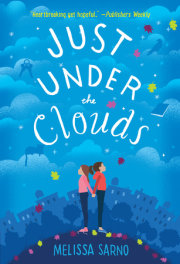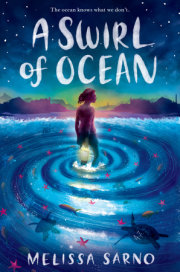Mom’s calling and I’m counting. My backpack’s tight on my back up here in the tree. Knees tucked neat over the branches. Bare feet dangling.
One . . . two . . . three . . . I soar. Out and then down and I’m at the dirt, balancing on the tree’s roots, while Adare spreads out on a clump of Brooklyn brown grass, like a snow angel without the snow.
“Coming!” I shout. I scoop up Adare’s hand. “Come on, you.”
Her breath is caught. She’s got a habit of holding it.
“Adare.” I stomp.
But her eyes are wide and they shine like gray glass. The sun’s in them, all pretty, sparkling, the way light hits water.
“Adare!” I close my eyes and wish her breath free.
She lets go of it and squirms her hand out of mine, then takes off running toward Mom, who’ll take us from the park back to Ennis House.
We’ve never lived in a shelter before, and even if we’ve never lived much of anywhere for too long, it feels like, for the first time, we don’t have a home. We’re
homeless. For real.
“Cora, I thought I told you to quit climbing. You’ve got to keep an eye on your sister after school,” Mom scolds as I chase behind.
Adare is buried in the limp of Mom’s shirt.
“I did,” I argue, but I know it’s no use. I take Mom’s hand in mine. It always feels like I’ve got to remind her I’m here, too. Her hands are pink and stained.
“Why are they pink?” I ask.
She smiles. “You’ll see.” Then she leans down so her whisper’s at my messy hair. “What do we have today?”
I open up my own hand. “A butterfly.”
She squeezes it tight because we might not have a ton of money or clothes, but now we have a monarch butterfly I drew in blue ink. Right there on my palm.
We walk the sidewalks to Ennis House. Adare and I march on opposite sides of Mom.
I call out trees as we pass. Pin oak. Honey locust. Linden. Maple. The female ginkgo drops berries that smell awful. I gave that one a name a long time ago. It’s called the vomit tree. When you pass one, you’d better hold your nose.
“What’s that?” Mom asks, pointing at a piney- looking tree.
I reach up and run its prickle over my thumb to count how many needles are bunched together on each branch. “White pine,” I say fast.
She shakes her head in surprise. “How can you tell?”
“Five needles per bundle.” I grin while she squeezes my hand again. She knows I’ve studied the photographs Daddy pasted in his field journal, which I call my Tree Book. She knows I’ve got my eye out for all the plants and trees I can find.
Like always, Adare stops a few thousand times during our ten- minute walk. She looks toward the sky, her chin sailing up like a flyaway balloon. I keep my sighs secret. Loud enough in my head so only I can hear them. We’re getting nowhere fast, and even if everything in me is itch-ing to complain, I don’t say a word.
Adare was born special, Mom always says. She tells the story like it’s legend. She talks about the wind that night, in its quickening swirl. She talks about the labor, long and uneasy, Adare turning circles in her womb. She talks about the moment Adare came into the world without a sound—
Not blue, no, more like lavender, like sunset—and in that moment all the oxygen gone from the world, the trees for-getting to breathe their gift, Adare forgetting, too.
She lost oxygen to the brain, but Mom doesn’t call it a disadvantage, like others do.
Adare sees things a different way, she always says.
It’s like all of us see from here—she places her hand at the level of her heart.
And Adare sees from up here—she sends her arm soaring.
Up where? That’s what I always wonder.
We stop at the corner. In the distance the big cranes dangle a bunch of car parts. The scrap metal piles are like rolling hills just past the BQE. We live near the canal now and I like it. The water might smell of dirt and weeds and rot, but when you stare at it real close, there’s a looping oil swirl and it looks like a broken rainbow nobody sees.
Inside Ennis House, the stairwell lights are burned out and the glass is split. Old Lou hovers, his eyes like two brown beetles, as Mom pushes us past.
“Don’t linger,” she says. We walk the dirty floor, past the smack of cockroach, which has been there three days. I’ve counted.
Mom’s hand stiffens, then tightens, like it always does. She squeezes my butterfly palm flat and everything in me knows better than to complain.
As we climb up the stairs, Mrs. Johnson shouts from behind the door with a voice that stomps the air and Fred C.’s place smells like sweet onions and old grill. My stomach starts roaring and in my head I tell it to quiet down. But it doesn’t listen.
When we get to five, my legs are burning and my sunflower backpack feels so heavy, it’s like it’s full of sinking rocks. Mom holds Adare’s backpack for her—the one I picked out for her at Winn Discount. I made sure it was bright blue like the sky.
The hall’s dark and narrow and we file through, Mom’s hand still crushing mine.
“It smells like cat pee.”
“It’s a trick,” Mom says. “To keep the mice away.”
Mom says you can buy all you want at places like Miss Li’s grocery. She says it’s called predator pee.
But we’ve got our own cat, Sookie, even if she’s more Adare’s than mine, sticking like glue to her and hissing at me. Mom jiggles the keys and opens the lock. Sookie takes one look at me and skitters underneath the quilt, which only draws attention to our messy mattress on the floor.
Mom shakes her head, guides us in, and deadbolts the door. “I thought I told you to make the bed.”
“What’s the sense in making a bed when you’re just going to get right back in?”
Mom gives a
Don’t get smart with me kind of look and I run around the mattress, pulling the sheets real fast, so they flutter-puff up and settle down. That always cracks Adare up, so I fluff them high again, and she’s got this sniffy laugh that always makes Mom smile.
Adare throws herself on the settling sheets. Her laughs are trampled and caught. I pull up the candy-colored quilt over her, quick. I love how soft it is from years of washing. Then I sit gently on her bony legs, pretending she’s not even there.
I announce it real loud: “Bed’s made!” Adare laughs and squirms, and Mom plays along, too.
She says, “Cora, I can’t find Adare. Do you know where she is?” until Adare is wriggling and laughing and poking her head out, her hair falling over her eyes in a tangle. It makes me smile when she smiles, sweet and pink.
Her voice is soft, like always, even if she sounds less like she’s ten and more like a baby. “I’m right here.”
“You’re right here,” I say.
“Yeah.”
Copyright © 2018 by Melissa Sarno. All rights reserved. No part of this excerpt may be reproduced or reprinted without permission in writing from the publisher.







